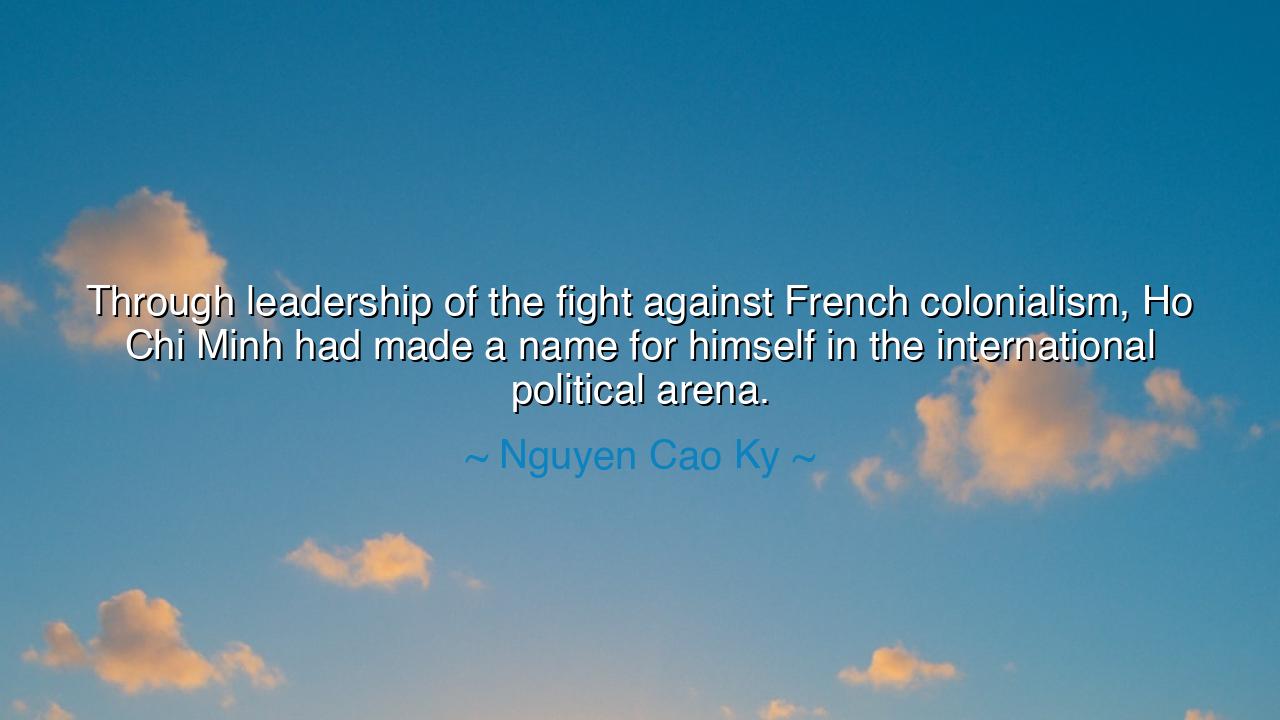
Through leadership of the fight against French colonialism, Ho
Through leadership of the fight against French colonialism, Ho Chi Minh had made a name for himself in the international political arena.






The words of Nguyen Cao Ky — “Through leadership of the fight against French colonialism, Ho Chi Minh had made a name for himself in the international political arena” — echo through the corridors of history like the steady beat of a revolutionary drum. Beneath this statement lies not only recognition of a man’s rise to prominence but the story of a people awakening from centuries of subjugation. It speaks of leadership born from struggle, of a name forged not in luxury or peace, but in fire and resistance. Ky’s words remind us that greatness often emerges not from comfort, but from confrontation with injustice — that the leader who shapes destiny is the one who dares to stand when others kneel.
In the style of the ancients, we may say that Ho Chi Minh became not merely a man, but a symbol — the living embodiment of Vietnam’s unyielding spirit. The phrase “through leadership of the fight” carries the weight of generations who yearned for liberation. From his youth, Ho Chi Minh understood that freedom demanded more than desire; it demanded organization, sacrifice, and vision. He carried the soul of his nation in exile — studying abroad, working in kitchens, and writing in the shadows — gathering both knowledge and allies to wield against the empire that claimed dominion over his homeland. Thus, by the time the winds of resistance rose, he had already become the voice of a movement that transcended one man, one generation, and even one nation.
The origin of this quote rests within a complex history, for Nguyen Cao Ky himself was a military leader of South Vietnam — a man who, though standing on the opposite side of Ho Chi Minh’s political vision, could not deny the profound impact of his rival’s legacy. His acknowledgment carries a certain reverence, even from across ideological lines. In this, there lies a deeper truth: that genuine leadership commands respect even from opponents. Ho Chi Minh’s role in the fight against French colonialism did not simply free a nation; it reshaped the balance of global power, inspiring countless other movements in Asia, Africa, and Latin America to challenge imperial domination.
Consider the moment in 1945 when Ho Chi Minh stood before his people and proclaimed the Declaration of Independence of the Democratic Republic of Vietnam. His words echoed the same principles found in the American Declaration — “All men are created equal.” Yet for him, these were not ideals to be quoted, but rights to be fought for. The French, who had ruled with arrogance and exploitation, dismissed the cries of liberty. But Ho Chi Minh understood a law older than any empire — that the spirit of a people cannot be colonized forever. And through his leadership, Vietnam became the forge in which that spirit was tested, refined, and ultimately made unbreakable.
Ky’s observation that Ho Chi Minh “made a name for himself in the international political arena” reveals more than mere fame. It speaks of recognition earned through endurance, and of moral power that transcends borders. Nations far beyond Asia began to see in Vietnam’s struggle the reflection of their own. Leaders from the colonized world, from Africa’s liberation movements to Latin America’s revolutions, drew inspiration from Ho Chi Minh’s example. His name became synonymous with defiance against imperialism, and his voice — calm, deliberate, unwavering — carried across the continents as a call to self-determination.
But there is also tragedy in such greatness. For every leader who rises through conflict, the weight of victory is borne in the suffering of his people. Ho Chi Minh’s vision united millions, but it also unleashed wars that scarred generations. Yet even in this, Nguyen Cao Ky’s words suggest a paradox — that leadership is not purity, but perseverance. To lead is to walk through storms, knowing that the world will judge you by both the light you bring and the shadows that follow. The mark of a true leader, then, is not perfection but purpose — the unyielding faith that one’s struggle, however painful, serves something greater than the self.
Let this be the teaching for all who hear: leadership is born not in peace, but in the proving ground of hardship. To make a name that endures is not to seek fame, but to devote one’s life to the cause of others. Ho Chi Minh’s journey reminds us that conviction, once ignited, can outlast empires. His struggle against French rule was not merely Vietnam’s, but humanity’s — the eternal struggle for dignity and freedom.
And so, remember this wisdom: when the forces of oppression rise, do not despair. Leadership emerges from necessity, and courage awakens in the heart of those who cannot bear to see their people bowed. Whether in nations or in small lives, the call is the same — to rise, to lead when the moment demands, and to let history remember your deeds not for power, but for purpose. For, as Nguyen Cao Ky’s words reveal, true leadership carves a name not in the marble of monuments, but in the conscience of mankind.






AAdministratorAdministrator
Welcome, honored guests. Please leave a comment, we will respond soon